

Tom Bettis
Tombettis.kw. Covid-19 vaccines may have potentially unpleasant side effects. Pfizer is expected to seek federal permission to release its Covid-19 vaccine by the end of November, a move that holds promise for quelling the pandemic but also sets up a tight time frame to make sure consumers understand what it will mean to get the shots.
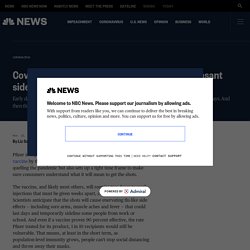
The vaccine, and likely most others, will require two doses to work, injections that must be given weeks apart, company protocols show. Scientists anticipate that the shots will cause enervating flu-like side effects — including sore arms, muscle aches and fever — that could last days and temporarily sideline some people from work or school. And even if a vaccine proves 90 percent effective, the rate Pfizer touted for its product, 1 in 10 recipients would still be vulnerable. That means, at least in the short term, as population-level immunity grows, people can't stop social distancing and throw away their masks.
Full coverage of the coronavirus outbreak "You need to be ready," he said. "A lot of folks don't have sick leave. Take Me To The River - Talking Heads. The 50 Most Epic Metal Albums Of All Time. Eminem - Cinderella Man -Music Video. Make the Line Dance. Moullinex - Catalina. Kinect Graffiti™ 3d Video with Kinect and iPad. COVID-19 vaccines: The new technology that made them possible. Days before her 91st birthday, Margaret Keenan became the first person in the world to receive the Pfizer-BioNTech COVID-19 vaccine outside of clinical trials.
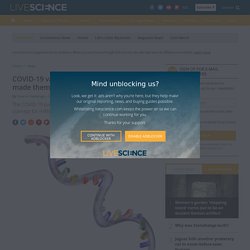
Keenan, who was sporting a polka-dot cardigan over a festive shirt, was given the first dose of a two-dose vaccine at the University Hospital Coventry in England, setting off the first mass vaccination effort against a virus that has now infected at least 70 million people worldwide and killed 1.5 million.
An 81-year-old named William Shakespeare was next in line for the vaccine. Keenan and Shakespeare are also the first humans, outside of a trial setting, to be given a vaccine that harnesses "mRNA" technology. This relatively new tech, which relies on a synthetic strand of genetic code called messenger RNA (mRNA) to prime the immune system, had not yet been approved for any previous vaccine in the world.
Related: Coronavirus live updates Tapping into a natural process mRNA vaccines are inspired by basic biology. Update: COVID-19 Vaccine Candidates and Abortion-Derived Cell Lines. To view this chart as a PDF, see: COVID-19 Vaccine Candidates and Abortion-Derived Cell Lines Updated January 4, 2021 Accurate information about the development and production of COVID-19 vaccines is essential, especially because many proposed candidates use newer molecular technologies for production of a viral vaccine.
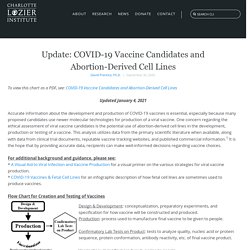
One concern regarding the ethical assessment of viral vaccine candidates is the potential use of abortion-derived cell lines in the development, production or testing of a vaccine. This analysis utilizes data from the primary scientific literature when available, along with data from clinical trial documents, reputable vaccine tracking websites, and published commercial information.1 It is the hope that by providing accurate data, recipients can make well-informed decisions regarding vaccine choices.
For additional background and guidance, please see: Flow Chart for Creation and Testing of Vaccines Phase 2Phase 1 Plant expression of protein and VLP Pseudovirus HEK293 cells. [namethemachine]_Kinect_2011,05,24. How a Covid-19 Vaccine Could End Up Helping the Virus Spread. A vaccine that protects against symptoms of Covid-19 could contribute to the spread of the disease if—and this is still just an if—the people who get vaccinated remain capable of carrying and transmitting the virus.
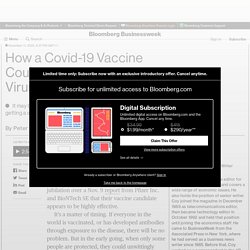
That’s a risk that’s gotten little attention amid the deserved jubilation over a Nov. 9 report from Pfizer Inc. and BioNTech SE that their vaccine candidate appears to be highly effective. It’s a matter of timing. If everyone in the world is vaccinated, or has developed antibodies through exposure to the disease, there will be no problem. But in the early going, when only some people are protected, they could unwittingly spread the disease to people who are still vulnerable. Pfizer's chairman says it's not clear whether people who are vaccinated can still spread COVID-19. Pfizer's CEO said it's not clear if the company's coronavirus vaccine will no longer be able to spread the virus to other people.Albert Bourla told NBC's "Dateline": "I think this is something that needs to be examined.
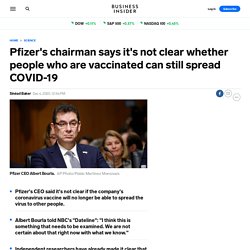
We are not certain about that right now with what we know. "Independent researchers have already made it clear that the trials used to test the vaccine did not examine its effects on transmission.The US could approve Pfizer's vaccine on December 10. It is already approved in the UK.Visit Business Insider's homepage for more stories. Coronavirus Australia: UQ COVID vaccine deal cancelled after HIV false positive results in participants.
"We have prepared for this.
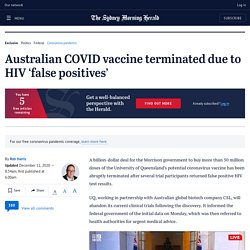
We have planned for this. And now we're making decisions in accordance with this," he said on Friday morning. He said the government had "spread the risk" by entering into multiple agreements and had secured 20 million new doses from Oxford University-AstraZeneca and another 11 million from Novavax to cover for the 51 million doses the home-grown product was to supply. Cookie Consent and Choices.
It All Starts with Trust – Guide to COVID-19 vaccine communications. Our willingness to put a foreign substance into our bodies is highly dependent on trust.
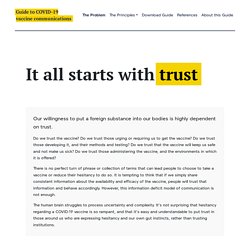
Do we trust the vaccine? Do we trust those urging or requiring us to get the vaccine? Do we trust those developing it, and their methods and testing? Do we trust that the vaccine will keep us safe and not make us sick? Do we trust those administering the vaccine, and the environments in which it is offered? There is no perfect turn of phrase or collection of terms that can lead people to choose to take a vaccine or reduce their hesitancy to do so. The human brain struggles to process uncertainty and complexity. Some of the factors driving the lack of trust within certain communities include: Inconsistency. False balance happens when a story or news account gives equal weight to two perspectives, or “both sides.” Covid-19 vaccinations.